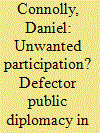|
|
|
Sort Order |
|
|
|
Items / Page
|
|
|
|
|
|
|
| Srl | Item |
| 1 |
ID:
186605


|
|
|
|
|
| Summary/Abstract |
The ASEAN Intergovernmental Commission on Human Rights (AICHR) is often regarded unfavourably, depicted at best as irrelevant in the battle to promote and protect human rights in Southeast Asia, and at worst, complicit in the abuse of human rights by its silence in the face of the region's human rights' tragedies. While AICHR has many limitations, we regard it as a work-in-progress, evolving as it was always meant to. To understand this evolution, we conceive of AICHR as a participatory space in which contestation of what AICHR can, and cannot, do is being undertaken by its Representatives. This contestation includes exposing its secretive face of power by revealing: the space human rights can be discussed in; who can participate and who is excluded in this discussion; and how malleable the norms that operate within this space are to change. The latter aspect of contestation engages with the thorny ‘problem’ of consensus. We argue that the presence of Representatives from outside of government has introduced a desire in AICHR for change; a dynamism that makes it a participatory space witnessing contestation that has the potential to enable AICHR to evolve. A space, therefore, that for all its shortcomings is worth watching.
|
|
|
|
|
|
|
|
|
|
|
|
|
|
|
|
| 2 |
ID:
186608


|
|
|
|
|
| Summary/Abstract |
With its Ulaanbaatar Dialogues (UBD) initiatives, Mongolia has emerged as one of the most increasingly influential diplomatic powerhouses in northeast Asia, despite its small size. Moved by the mixed interests of garnering global influence and a small-state security strategy, the country has positioned itself as an honest neutral peace broker in the Korean conflict since 2013. Mongolia has demonstrated itself to be a successful third party in defusing tensions and, more crucially, jump-starting declining regional multilateral mechanisms for the Korean peace process. This study explores the undiscovered potential of small-state power. Mongolia shows how small states effectively increase their transnational appeal and expand their foreign policy reach through diplomatic mediation. This article examines the sources, strategies, and mechanisms of Mongolia’s mediation efforts, looking at the core features of Mongolian foreign policy and its diplomatic relations, and then focuses on the UBD initiatives – the country’s efforts as a third party to mediate the Korean Peninsula peace process. Thereby, this study contributes to the knowledge on the practice of international relations by reflecting on the burgeoning role of the Global South.
|
|
|
|
|
|
|
|
|
|
|
|
|
|
|
|
| 3 |
ID:
186610


|
|
|
|
|
| Summary/Abstract |
This article focuses on the varying intensity of political clash that South Korea has got involved in with Japan regarding the territorial dispute, Dokdo/Takeshima. Existing works are limited to acknowledging the role of nationalism as a key obstacle to the negotiation or settlement of the territorial dispute. However, democratically elected Korean leaders at times remained low key in the territorial problem and even sought collaboration with Japan despite the existence of nationalism. Specifically, South Korea employed both calm and hardline diplomatic choices in the territorial dispute. Why did South Korea choose disparate territorial policies despite the population’s anti-Japanese sentiments? Under what circumstances did leaders in Korea employ dovish diplomacy that might cause a strong backlash from the public? Introducing the vulnerability-restraint theory, I argue that top decision makers’ political vulnerability in domestic politics and the restraining pressure from the United States have impact on the final choice of foreign policy.
|
|
|
|
|
|
|
|
|
|
|
|
|
|
|
|
| 4 |
ID:
186607


|
|
|
|
|
| Summary/Abstract |
The paper examines the concept of populism and how it is grounded in both democracy and nationalism, with a focus on the implications of its rise for the international trading system. The drivers of the demand for populist politics (economic, cultural, and political) are discussed. The factors facilitating the supply of populist politics are also reviewed. A synthesis is developed, with an interest in identifying common elements across different national experiences. The point is then made that populists are often opposed to ‘globalism’ but not necessarily to an active participation in trade. The conclusion considers the options for a response to populism, and the challenges populism poses for Australia.
|
|
|
|
|
|
|
|
|
|
|
|
|
|
|
|
| 5 |
ID:
186606


|
|
|
|
|
| Summary/Abstract |
This paper investigates the Singapore state’s varied responses toward dissent and explores the modes of control employed by the state towards varied dissent. We argue that any attempt to understand the politics of control in Singapore is incomplete without understanding how the state calibrates liberalisation as a third primary strategy. This study contributes to a more nuanced comprehension of how hybrid regimes can expand their modes of control. It offers a new framework to understand how tools of dominance are calibrated to adapt to a shifting socio-political landscape and calls for viewing liberalisation as a method of extending control.
|
|
|
|
|
|
|
|
|
|
|
|
|
|
|
|
| 6 |
ID:
186609


|
|
|
|
|
| Summary/Abstract |
The controversy surrounding defector balloon launches into North Korea is often viewed as a bizarre example of Cold War legacies on the Korean peninsula. However, it is also a unique case study of non-state public diplomacy because these groups are attempting to engage in cross-border communication against the wishes of their host government. This article argues that South Korea’s unique interpretation of public diplomacy as a participatory activity has proven vulnerable to non-state organisations with divergent views of the national interest, which has resulted in two different types of public diplomacy being directed at North Korea. Subsequent attempts by the South Korean government to control the dissonant public diplomacy of non-state groups resulted in reputational costs for both sides and ultimately failed to prevent defectors from advancing their claim to a human right to communicate across national borders. Even though this case study broadly supports a polylateral interpretation of public diplomacy, it cautions that human rights discourses may obscure the fact that the traditional diplomatic system was designed to mitigate many of the risks associated with non-state diplomatic actors. Therefore, this paper suggests the need for more discussion about the consequences of a right to communicate across national borders.
|
|
|
|
|
|
|
|
|
|
|
|
|
|
|
|
|
|
|
|
|